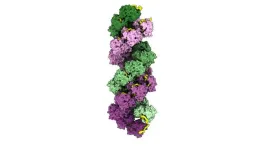(Press-News.org) Virginia Commonwealth University (VCU) has been awarded a five-year, $9 million grant from the National Cancer Institute to establish a pioneering Cancer Control Equity Research Center. This initiative aims to enhance the dissemination and implementation of health promotion and cancer prevention services for individuals and families residing in Virginia's Housing and Urban Development (HUD)-administered income-based housing communities in the Greater Richmond region and Hampton Roads.
Adults in under-resourced communities are placed at disproportionate risk for cancer, facing a higher incidence of the disease compared to their more affluent counterparts. Despite this alarming trend, there is a significant gap in evidence-based methods to enhance cancer prevention services in these communities. Addressing this disparity is critical to improving health outcomes and reducing cancer rates among vulnerable populations.
The collaborative research effort brings together experts from VCU’s Massey Comprehensive Cancer Center, School of Medicine and School of Public Health, as well as Macon & Joan Brock Virginia Health Sciences at Old Dominion University (ODU). The project will be co-led by Bernard Fuemmeler, Ph.D., M.P.H., associate director of population sciences and Gordon D. Ginder, M.D., Chair in Cancer Research at VCU Massey; Jessica LaRose, Ph.D., professor and interim chair of social and behavioral sciences at the VCU School of Public Health; and Brynn Sheehan, Ph.D., associate professor and director of the Research and Infrastructure Service Enterprise at Macon & Joan Brock Virginia Health Sciences at ODU.
Through a multidisciplinary, team science approach, they will work closely with other researchers, community co-leaders and the Housing Collaborative Community Advisory Board (HCCAB) to establish the Virginia Advancing Cancer Control Equity Research Through Transformative Solutions (VA-ACCERT) Center.
“This is a remarkable accomplishment in the history of our organization,” said Fuemmeler, who is also the director of research in the Department of Family Medicine and Population Health at the VCU School of Medicine. “I have no doubt that this center will synergize health disparities research across VCU and become a national beacon of success for advancing health equity research throughout the commonwealth and beyond.”
In this project, community members will serve as active collaborators and co-investigators, with a strong emphasis on authentic community engagement and partnership. All interventions will be designed collaboratively with HCCAB and community co-leads. In the first year, the team will develop and deliver training programs for HUD staff, with the specific goal of addressing and reducing exposure to discrimination at both the individual and community levels.
“This work is truly transformative because it centers the voices and needs of the communities we serve,” said Sheehan. “By engaging directly with residents, we’re ensuring that the solutions we implement are not just impactful, but deeply meaningful for those who live here. Through our partnerships and interventions, we aim to break the cycle of disparities and pave the way for generations to experience better health and health outcomes.”
At the core of this initiative is a multilevel intervention (MLI) rooted in an asset-based framework that targets key social drivers of health. In partnership with each income-based housing community, the project will introduce structural interventions at the built environment level, such as initiatives aimed at improving food access and affordability, and promoting physical activity. The MLI will also include individual level activities, including hotspot and tablet access and a comprehensive digital lifestyle intervention, as well as community level activities open to all residents, such as experiential nutrition events conducted by a local community partner. These efforts will be driven by a comprehensive understanding of the community's assets and needs, aiming to enhance health equity and wellbeing across multiple levels.
“Our focus on HUD is unique, and the potential for structural impact and long-term sustainability is significant,” said LaRose, who is also a member of the Cancer Prevention and Control research program at Massey. “We have the opportunity to directly address the root causes of cancer disparities and promote organizational changes within HUD to improve the lives of residents living in income-based housing.”
Additionally, the VA-ACCERT Center will serve as a hub to foster a more diverse workforce of early-career investigators, who will possess the expertise and support to guide new cancer prevention and control strategies within income-based housing communities.
The research emerging from this initiative, along with three other similarly NCI-funded projects in the U.S., will accelerate new discoveries aimed at advancing multilevel, community-engaged implementation science. These efforts are crucial to reducing cancer disparities and improving health equity nationwide.
END
VCU secures $9 million grant to establish Cancer Control Equity Research Center in Virginia
This initiative aims to enhance the dissemination and implementation of health promotion and cancer prevention services for individuals and families residing in Virginia's Housing and Urban Development-administered income-based housing communities i
2024-12-16
ELSE PRESS RELEASES FROM THIS DATE:
AgriLife Research leads collaboration to address zebra chip disease
2024-12-16
Texas A&M AgriLife Research scientists are working on a new research project to fight plant diseases transmitted by psyllid insects — particularly the zebra chip disease, which has impacted potato production for decades.
Funded by a $682,500 grant from the U.S. Department of Agriculture National Institute of Food and Agriculture, this three-year project will investigate the mechanisms through which the bacterial pathogen Candidatus Liberibacter solanacearum affects plant and insect immune systems, leading to agricultural losses.
The findings by researchers in the Texas A&M College of Agriculture and Life Sciences could ...
New drug shows promise against Duchenne muscular dystrophy
2024-12-16
A novel drug holds promise for treating Duchenne muscular dystrophy (DMD), a rare genetic disorder that causes severe muscle degeneration.
McGill University researchers have discovered that an experimental compound called K884 can boost the natural repair abilities of muscle stem cells. Current treatments can slow muscle damage, but don’t address the root problem.
DMD affects about one in 5,000 boys worldwide, often leading to wheelchair dependence by the teenage years and life-threatening complications ...
Influenza virus genome: finally discovered in its coat
2024-12-16
To fight the virus that causes influenza, one of the avenues being explored by scientists is the development of drugs capable of destabilising its genome, made up of eight RNA1 molecules. But the challenge is daunting: each RNA molecule is tightly bound to an assembly of proteins which creates a double helix, forming a protective coat that is difficult to manipulate.
For the first time, however, the structure of this protective mantle and its interactions with the virus' RNA have been described on an atomic scale by scientists from the CNRS2 ...
AASM advocates for permanent sleep telehealth services to enhance patient care nationwide
2024-12-16
DARIEN, IL — The American Academy of Sleep Medicine has issued a new position statement advocating for permanent telehealth coverage, emphasizing its essential role in providing high-quality, patient-centered care for individuals with sleep disorders.
The position statement, published as an accepted paper in the Journal of Clinical Sleep Medicine, comes at a crucial turning point as current telehealth flexibilities implemented by the Centers for Medicare and Medicaid Services in response to the COVID-19 public health emergency are set to expire this month. The AASM emphasizes that permanent coverage with adequate reimbursement is vital for the ...
Staphylococcus aureus thwarts vaccines by turning on a protein that halts immune response
2024-12-16
Staphylococcus aureus (S. aureus) is a major cause of skin and soft tissue infections that can sometimes lead to sepsis and toxic shock syndrome. The microbe poses a significant threat to public health, made worse by the spread of methicillin-resistant Staphylococcus aureus bacteria (MRSA) in recent years. According to The Lancet, S. aureus was associated with more than one million deaths around the globe in 2019.
“It is a pathogen in dire need of control because it causes significant morbidity and mortality not just in the United States, but worldwide,” ...
Wedel studying how transnational networks shape non-Western offshore spaces
2024-12-16
Wedel Studying How Transnational Networks Shape Non-Western Offshore Spaces
Janine Wedel, Distinguished University Professor, Schar School of Policy and Government, received money for a project on the growing non-Western offshore system used by transnational networks emanating from autocratic regimes such as Russia to skirt international checks and balances. Wedel and her colleagues are investigating these informal networks and how they enable “weaponized corruption” — the use of corruption for geopolitical ends — and the evasion of Western sanctions. They are ...
Costa and Matsumoto receive funding for hypothesis evaluation and reasoning assistant
2024-12-16
Paulo Costa, Director, C5I Center; Dept. Chair Cyber Security Engineering, College of Engineering and Computing (CEC), and Shou Matsumoto, Research Assistant Professor, C5I Center, CEC, received funding for the project: “HERA: Hypothesis Evaluation and Reasoning Assistant.”
Costa and Matsumoto are developing an explainable artificial intelligence (AI) methodology for hypothesis management and an architecture for the proposed solution. They are also supporting Interactive Aptitude, LLC, in defining use cases in one or more domains and identifying data requirements to support hypothesis management. The Mason/Interactive Aptitude team's solution ...
New research about drought impacts on wildlife can inform conservation strategies
2024-12-16
FORT COLLINS, Colo., December 11, 2024 — People around the world are dealing with drought, so it’s not shocking that it affects wildlife, too: lack of moisture contributes to habitat loss, affects how animals compete for resources, and leads to dehydration and heat stress. The surprising part? The extreme degree to which many animals may need to adapt.
New research predicts that many wildlife species in the continental United States will experience year-long droughts nearly five times as often in the coming decades (2050-2080) than they did historically (1950-2005). In an even more dramatic turn of events, three-year droughts ...
Elucidating the neural mechanisms of stress-induced cardiovascular responses
2024-12-16
Tsukuba, Japan—Under stress, animals change their behavior, such as through "fight or flight" or "freezing" response. Simultaneously, physiological responses essential for stress adaptation are triggered in the body. Cardiovascular regulation, including changes in blood pressure and heart rate, is a critical stress response.
Researchers have focused on the lateral habenula, a brain region where neurons are activated in response to stress. They investigated the neural mechanisms underlying cardiovascular responses by activating ...
Researchers discovered molecular events leading to Rett syndrome
2024-12-16
Researchers at Baylor College of Medicine, Jan and Dan Duncan Neurological Research Institute (Duncan NRI) at Texas Children’s Hospital and collaborating institutions have gained new insights into the molecular changes leading to Rett syndrome, a severe neurological disorder caused by mutations in the MeCP2 gene encoding methyl-CpG binding protein 2 (MeCP2). The team reports in the journal Neuron that loss of MeCP2 in adulthood causes immediate progressive dysregulation of hundreds of genes – some are activated while others are suppressed – and these changes occur well before any measurable deficiencies in neurological function.
The MeCP2 protein is most highly expressed ...
LAST 30 PRESS RELEASES:
Justice after trauma? Race, red tape keep sexual assault victims from compensation
Columbia researchers awarded ARPA-H funding to speed diagnosis of lymphatic disorders
James R. Downing, MD, to step down as president and CEO of St. Jude Children’s Research Hospital in late 2026
A remote-controlled CAR-T for safer immunotherapy
UT College of Veterinary Medicine dean elected Fellow of the American Academy of Microbiology
AERA selects 34 exemplary scholars as 2026 Fellows
Similar kinases play distinct roles in the brain
New research takes first step toward advance warnings of space weather
Scientists unlock a massive new ‘color palette’ for biomedical research by synthesizing non-natural amino acids
Brain cells drive endurance gains after exercise
Same-day hospital discharge is safe in selected patients after TAVI
Why do people living at high altitudes have better glucose control? The answer was in plain sight
Red blood cells soak up sugar at high altitude, protecting against diabetes
A new electrolyte points to stronger, safer batteries
Environment: Atmospheric pollution directly linked to rocket re-entry
Targeted radiation therapy improves quality of life outcomes for patients with multiple brain metastases
Cardiovascular events in women with prior cervical high-grade squamous intraepithelial lesion
Transplantation and employment earnings in kidney transplant recipients
Brain organoids can be trained to solve a goal-directed task
Treatment can protect extremely premature babies from lung disease
Roberto Morandotti wins prestigious Max Born Award for pioneering research in quantum photonics
Scientists map brain's blood pressure control center
Acute coronary events registry provides insights into sex-specific differences
Bar-Ilan University and NVIDIA researchers improve AI’s ability to understand spatial instructions
New single-cell transcriptomic clock reveals intrinsic and systemic T cell aging in COVID-19 and HIV
Smaller fish and changing food webs – even where species numbers stay the same
Missed opportunity to protect pregnant women and newborns: Study shows low vaccination rates among expectant mothers in Norway against COVID-19 and influenza
Emotional memory region of aged brain is sensitive to processed foods
Neighborhood factors may lead to increased COPD-related emergency department visits, hospitalizations
Food insecurity impacts employees’ productivity
[Press-News.org] VCU secures $9 million grant to establish Cancer Control Equity Research Center in VirginiaThis initiative aims to enhance the dissemination and implementation of health promotion and cancer prevention services for individuals and families residing in Virginia's Housing and Urban Development-administered income-based housing communities i


